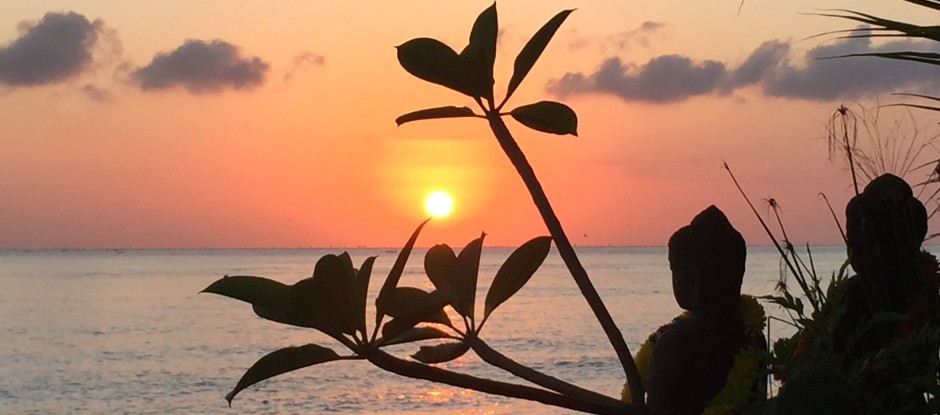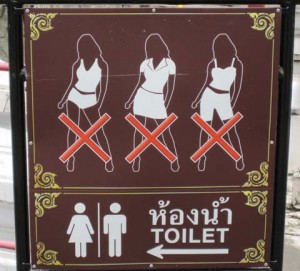Call me a masochist, but these last two years have been a series of self-inflicted uncomfortable situations in foreign countries. I have done all of this by my own free will, which makes it feel all the more insane.
But what I have learned by bumbling my way around southeast Asia could fill a book. Those of you who are familiar with my last two blogs can attest to this fact!
Here I summarize some lessons I learned the hard way through my travels. Some of these stories are re-runs, but I’ve tried to come up with new ones as well. Those old journals are gold mines!
1. Smile. A smile transcends culture and language, and can actually change the whole dynamic of a situation.
In Sumatra, when a drunk local thought it would be fun to put his hands all over me, I smiled at a group of local women who spoke NO English. They quickly surrounded me and told that man to get lost. The fact that they almost killed him in the parking lot aside, just one quick smile and gesture of “help” was all it took to acquire local friends and safety.
I think this idea is universal. People want to help, especially if you smile warmly at them – and mean it.
“Being Polite” fits into this notion as well. Saying a warm “No, thank you” to a local vendor is a lot more polite and friendly than ignoring them. Being polite is never a waste of time or energy.
2. Don’t be stupid. Getting really wasted in local “night spots” is a sure way to get in trouble, as is flashing a lot of money, electronics, or jewelry.
In one of many stupid moments in Beijing, thinking I knew more than a tourist map, I got completely and utterly lost. Crying on a street corner didn’t evoke any sympathy. Instead, I had to put my Lonely Planet “Dangers and Annoyances” knowledge to good use, stat!
I remembered that LP China said that most pharmacists in China know English. I found the nearest pharmacy, and what do you know? A pharmacist not only helped me figure out where I was and where I needed to go – she chastised a cab driver who tried to refuse to take me.
3. Don’t be too smart. The previous example illustrates this point well. My main idea here is don’t go around thinking that just because you have studied, read about, talked to others about, or otherwise gleaned knowledge about a place or culture that you know anything. You don’t.
Case in point: Tana Toraja. There is not a lot out there about TT for a silly foreigner to read to get any kind of accurate accounting of this culture. But WOW was my mind blown by just opening up to the experiences I had there and learning from them. It was liberating to go into a place totally oblivious to the local language and culture because it was all so new and novel. Smarty pants me would have been miserable.
4. Be patient and flexible. We in “The West” have grown up with a factory-style mentality about time. Those in developing countries believe that time is much more fluid and “negotiable.”
While many have accommodated our need for timeliness, others just don’t get it and/ or don’t give a shit. And why should they? We are in their country, BTW – shouldn’t it be we who adapt?
The best personal example of this is when, on the first day of training in TT, my host said that we would be at least two hours late. No one would be there on time, and the ones who were would just feel “punished” for having to sit there waiting. Imagine showing up to the first day of your new job two hours late?!? Guess what? I wasn’t fired:)
5. Fake it till you get it. While there are certain “universal truths” about various cultures, people are people.
You can learn everything about “how to be a good tourist in XYZ place” and then you meet a local who could care less that you don’t take your shoes off in their house, wai to them, etc.. SHAZAM!
This truth is especially cogent in a country as culturally diverse as Indonesia – what’s accepted in one local culture might not even be acknowledged in another.
In Bintan, basically a tourist mecca for Singaporeans, many of the “Western” ideas I felt comfortable with were firmly in place. The one thing that I wasn’t sure about, however, was why people were so friendly there. I had just finished a month in Vietnam where, as a tourist, I basically had to put up a barrier against EVERYONE because they were trying to sell me something.
My gracious, patient Bintan host, Dina, told me that when someone said hello to – EUREKA! – smile and say hello back. From that point on I made it a point to either watch and listen A LOT or ask a local for clarification.
6. Observe the local dress code. And not just to the “bare minimum.”
I can’t tell you how many tourists I’ve seen completely disrespecting local and norms in sacred places. Nothing makes me more uncomfortable. Women – if you’re going to a temple (anywhere!) cover your chest, shoulders, and knees. Men, you have it a little easier, but just follow the local instructions. Seriously.
At the tiger temple I visited in Thailand, not only did women need to cover up, we couldn’t wear pink, red, or orange, or any clothing that “flowed.” In part because I would NOT enjoy being devoured by a pissed off tiger, these rules were easy to follow. But even if the consequence is less severe than, say, decapitation, just follow the rules.
Local people worship where we traipse. Respect is the least we can give them in return for sharing their sacred space with us.
7. There are angels everywhere. Hallelujah for those angels, too, because they will come out of the woodwork both when you most need them and when you least expect them.
Trying to come up with just one example of when angels came to my rescue during these travels is a stumper.
Maybe it was the guy who helped my colleague and me when we got kicked out of a taxi in the middle of Bangkok and didn’t know where in the hell we were.
Maybe it was the woman from San Fran who offered to FedEx my bag to me in Thailand if I couldn’t make my connection.
Maybe it was the fact that an incredible exhibit of Dali sculpture happened to open in Singapore the day before I arrived.
Maybe it’s every reader who says, “I felt like I was traveling right along with you the whole time you were gone!” Angels, all of you.
Perhaps the moral to this whole disjointed story is that we’re all on this wild ride called life together. We can pretend our lives matter as individuals, but in reality, they don’t. It’s what we do with others, and for others, that really leaves our mark on the world.
Namaste.



